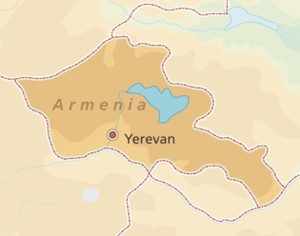The U.S. has little leverage to influence developments in Armenia’s shifting political and security landscape, according to experts on the post-Soviet space, Eurasianet’s Grigor Atanesian reports.
The current geopolitical shift in the region, particularly a Russian-Turkish rapprochement and stronger Azerbaijan-Russia relations, resulted in Armenia looking for support from the European Union and the United States, said Miriam Lanskoy, (above), senior director for Russia and Eurasia at the National Endowment for Democracy.
 Though recent trends are creating new opportunities for the West, they also carry danger, she told a forum (above) addressing “Armenia’s New Challenges” at the Center for Strategic and International Studies. Every time global powers rearranged their stances, “there was a war in the Caucasus,” Lanskoy warned.
Though recent trends are creating new opportunities for the West, they also carry danger, she told a forum (above) addressing “Armenia’s New Challenges” at the Center for Strategic and International Studies. Every time global powers rearranged their stances, “there was a war in the Caucasus,” Lanskoy warned.
At home, the move toward a parliamentary system following the controversial December 2015 constitutional referendum has raised concerns about the state of democracy, CSIS cautioned. Meanwhile, the crisis in relations between Russia and the West, coupled with the potential resumption of the conflict over Nagorno-Karabakh, which briefly broke into open conflict in the spring of 2016, threatens regional stability.
The new U.S. ambassador to Yerevan has pledged to “support and strengthen Armenian civil society.”
But Armenia “has been receiving diverse assessments of its democratization process,” says the European Forum on Democracy and Solidarity:
The run up to national elections has been quite free and fair in recent years, even if the election day itself would usually be marked by falsifications. A constitutional amendment, accepted through a referendum in 2015, will transfer Armenia into a parliamentary republic in April 2018, at the same time as the election of the new prime minister. Most of the president’s power will be carried over to the new prime minister and his cabinet. The opposition has been critical, believing that this is simply an attempt by the current President Serzh Sarkisian to remain in power in a different capacity after the end of his second and final presidential term.







